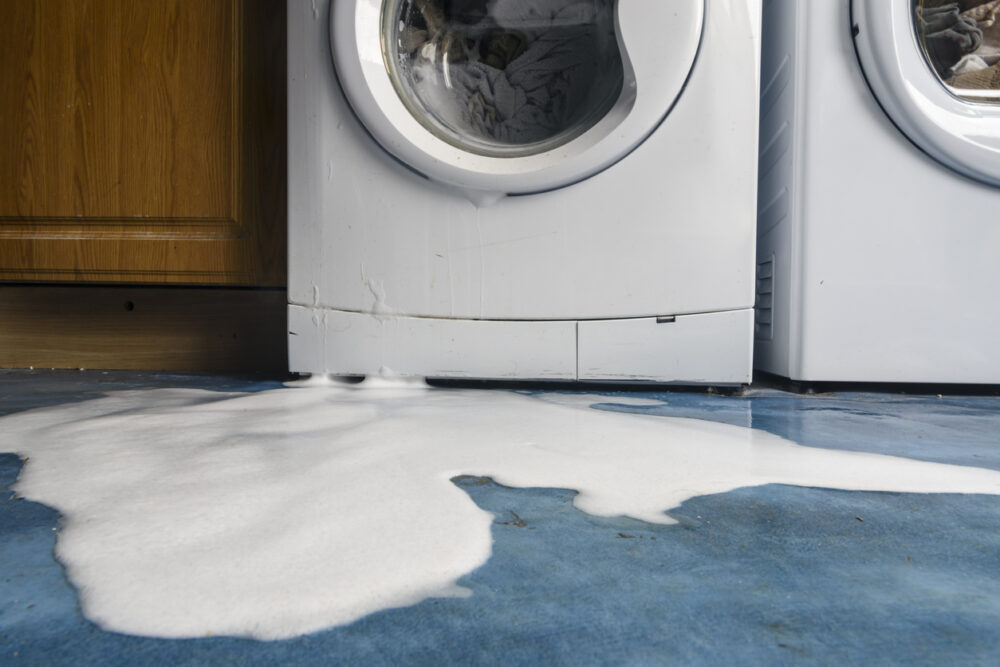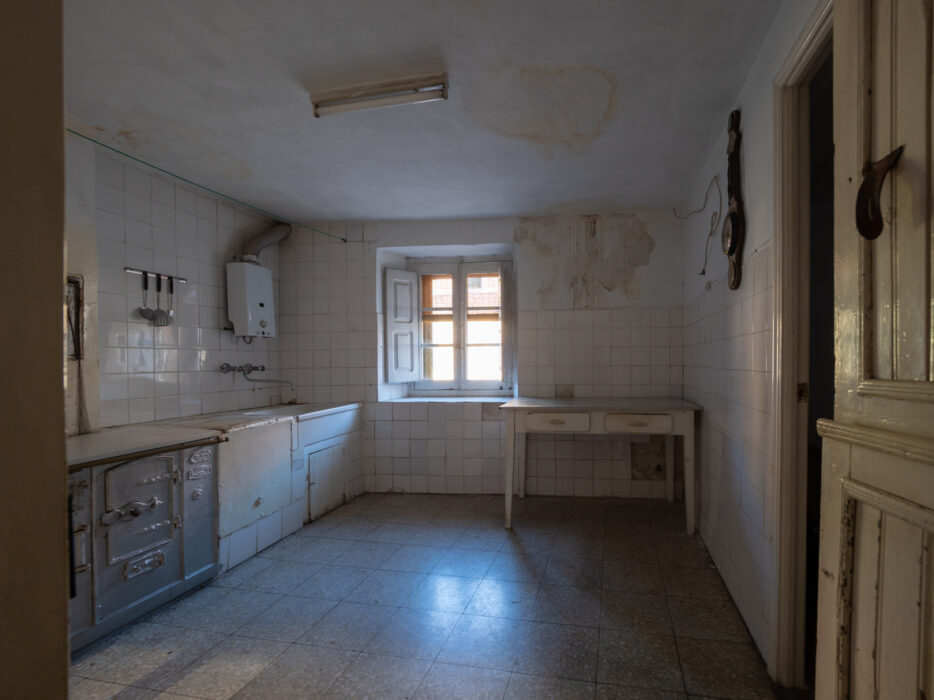When the rent’s this high, the ceiling better not leak.

Moving into a new apartment always feels like a fresh start—until your gut starts whispering that something’s off. Maybe it’s the squeaky floorboards, the weird smell in the hallway, or the way your landlord dodges basic maintenance questions. Still, the rent keeps draining your account every month, and you start wondering if you’ve been scammed into paying luxury prices for budget-level living. You’re not alone.
The truth is, overpriced apartments are more common than landlords care to admit. Some disguise inflated rent with trendy paint colors, others slap “amenities” on things like coin-op laundry and a shared Wi-Fi signal that barely works. If your rent keeps climbing but the value doesn’t, it might be time to call it what it is—a ripoff. These nine red flags can help you recognize the signs before you sign (or re-sign) that lease. Knowing them might not lower your rent, but it’ll at least give you the upper hand when it’s time to negotiate—or move.
1. The location doesn’t justify the price.

You can put lipstick on a pig, but if your “urban oasis” is wedged between a gas station and a tire shop, it’s probably not worth luxury rates, according to Darby Mulligan at Redfin. Some landlords bank on the idea that proximity to anything remotely popular justifies high rent. But being vaguely near a cool neighborhood is not the same as living in it. If you still need to drive to get groceries, restaurants, or public transportation, you’re paying for a fantasy.
It’s not about needing a glamorous address—it’s about value. Walkability, safety, and convenience matter more than a vague claim about being “minutes from downtown.” Before locking in a lease, take a walk around the area during different times of day. If you don’t feel comfortable at night or everything’s closed by 6 p.m., your rent better reflect that reality. Paying top dollar for a mediocre spot is one of the clearest signs you’re being taken for a ride.
2. You’re paying for amenities you never use.

If your rent includes access to a “gym” that consists of one busted treadmill and a yoga mat, you’re not exactly living large, as reported by Scott Steinberg at Rocket Mortgage. Some apartment complexes slap on amenity fees for things that sound fancy but are barely functional. Rooftop lounges, dog parks, business centers—they all sound nice, but if you never use them (or they’re always locked), they’re just shiny excuses for charging more.
It gets worse when those fees are non-negotiable. Even if you don’t own a pet, you’re helping cover maintenance on the dog spa. Never once sat in the sauna? Too bad—it’s in your rent. Take a hard look at the extras you’re supposedly paying for. If they don’t improve your life, you’re essentially handing over money for decoration. The smartest move? Ask for a breakdown of those fees and calculate how much you’re actually using. The math might surprise you.
3. Basic maintenance takes forever—or doesn’t happen.

You’re shelling out a chunk of your paycheck every month, yet your shower still drips and your heater’s been broken since last winter, as stated by Adrian Goslett at Property24. If your landlord treats maintenance like a luxury instead of a necessity, that’s a major red flag. Rent at premium prices should come with premium service, or at least the bare minimum of functional plumbing and electricity.
When you’re paying above market rate, you shouldn’t have to beg to get a leak fixed. Some landlords assume that once you’re locked into a lease, you’ll tolerate anything. But a slow response to maintenance—or worse, complete avoidance—signals a landlord who’s all about profit and not about responsibility. If you find yourself doing repairs or constantly waiting on help, you’re not getting what you paid for. That alone might justify breaking your lease.
4. Rent increases feel completely random.

You just got comfortable and then boom—the rent shoots up by $200 with no explanation. There’s no renovation, no upgraded appliances, no new services. Just a higher number and a generic excuse about “market adjustments.” When rent spikes aren’t tied to real value, it’s often just landlords testing how much they can get away with.
If you live in an area with no rent control, you might feel powerless. But tracking past increases and comparing them to inflation or neighborhood averages gives you ammunition to push back. A landlord who routinely raises rent without justification is betting you won’t do your homework. Call that bluff. Ask for data, cite comparable units, and if they can’t provide a straight answer, it’s likely you’re overpaying already.
5. The appliances are outdated or broken.

You’re paying like it’s 2025, but your oven looks like it survived the ‘90s. Worse, half the burners don’t work, and your dishwasher sounds like it’s grinding gravel. Old appliances aren’t just inconvenient—they drive up your energy bills and make daily tasks more frustrating than they need to be. If your rent is climbing while your kitchen still belongs in a retro sitcom, something’s off.
Appliances are one of the easiest upgrades landlords can make to justify rent hikes, but some skip this step entirely. They rely on tenants not knowing they can push back. Take photos, document issues, and request replacements. If they refuse or stall, it’s a sign your high rent is lining pockets—not improving your home. You deserve working tools for daily life, not vintage museum pieces that barely function.
6. The building has major pest problems.

If you’ve got roommates with antennae and tails, it doesn’t matter how nice the countertops are—you’re overpaying. Roaches, mice, ants, bedbugs—they’re not just gross, they’re health hazards. And in most states, landlords are required to provide pest control as part of maintaining habitable living conditions. If your building cuts corners on this, they’re pocketing your rent without delivering the basics.
Even worse, pest problems rarely stay isolated. A few roaches in the hallway often means an infestation behind the walls. If management brushes off your complaints or tells you to handle it yourself, that’s a big signal your rent is going toward profit, not protection. You shouldn’t need to sign a lease and stock up on traps. That’s not rent—that’s rent and pest control rolled into one unjustified package.
7. You’re paying luxury prices but getting DIY upgrades.

You walk into a showing and see new floors, fresh paint, and shiny cabinet handles—but the more you look, the more things feel slapped together. Gaps between tiles, wobbly fixtures, and paint streaks on the light switches tell the real story. Many landlords try to fake a high-end makeover on a dollar-store budget, then jack up the rent because it looks renovated.
These cosmetic touch-ups are like putting glitter on a crack—it shines until it doesn’t. If you notice corners cut or shortcuts taken, don’t assume it’s an oversight. It’s usually intentional. Sloppy upgrades are a telltale sign you’re being sold on aesthetics instead of substance. Look past the sparkle and ask hard questions about what’s actually been improved. If the answers feel vague or defensive, trust your gut—and your bank account.
8. Parking is a nightmare—and not included.

You live in a city where parking is harder to find than affordable housing, yet your building doesn’t offer a single spot unless you pay extra. Or worse, the “included” parking turns out to be a gravel patch two blocks away that floods every time it rains. Meanwhile, your rent suggests you should be living like royalty.
Parking costs can quietly add hundreds to your monthly expenses, especially if street parking comes with time limits or constant tickets. If you’re already paying high rent and still hunting for a place to park your car every night, that’s not just annoying—it’s overpriced. A decent apartment should at least come with a reasonable parking solution. If it doesn’t, your rent should reflect that reality, not pretend it’s part of the package.
9. You’re locked into long leases with no perks.

Some landlords try to sweeten long leases by offering stability—but then toss in every restriction imaginable. You can’t paint the walls, hang shelves, or even own a pet without an extra deposit. Meanwhile, rent stays high, amenities stay broken, and your neighbor’s smoke alarm won’t stop beeping. If you’re locked into this for 18 months or more, you’re trapped in an overpriced cage with no wiggle room.
Long-term leases should come with benefits—rent stability, minor upgrades, or more flexible living terms. If you’re getting none of that and still paying top dollar, you’re essentially subsidizing their mortgage while sacrificing your quality of life. Before signing anything long-term, ask what perks come with it. If there aren’t any, treat that as your signal to keep looking. High rent shouldn’t come with high restrictions and zero return.
